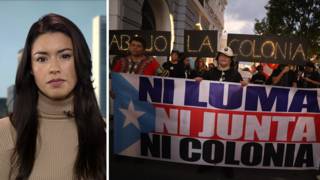
Guests
- Juan GonzálezDemocracy Now! co-host, former staff writer at the New York Daily News and author. His new book is called Reclaiming Gotham: Bill de Blasio and the Movement to End America’s Tale of Two Cities. He’s also author of Harvest of Empire: A History of Latinos in America and many more.
President Trump is slated to visit Puerto Rico tomorrow, nearly two weeks after Hurricane Maria devastated the island. Puerto Rico’s 3.5 million residents still have nearly no electricity and dwindling supplies of food, fuel and fresh water. San Juan Mayor Carmen Yulín Cruz has begged the federal government for more help, warning, “We are dying, and you are killing us with the inefficiency and the bureaucracy.” For more, we speak with Juan González, Democracy Now! co-host, former staff writer at the New York Daily News and author. His new book is called “Reclaiming Gotham: Bill de Blasio and the Movement to End America’s Tale of Two Cities.”
Transcript
AMY GOODMAN: This is Democracy Now! I’m Amy Goodman, with Juan González. Nearly two weeks after Hurricane Maria slammed into Puerto Rico, the capital San Juan is still facing a dire lack of food, clean water, electricity. Hanging over one of San Juan’s freeway overpasses near the neighborhood of Playita are multiple cloth signs reading, in Spanish, ”SOS Playita needs food and water.”
Juan, before we go to hear the voices from people in the streets and neighborhoods of San Juan, what do you think is most important to understand right now? And also, this startling news that you just shared about a Puerto Rican longtime leader dying, and the idea that there may be—the death toll may be much higher, as the reporter from Puerto Rico reported on Democracy Now! on Friday?
JUAN GONZÁLEZ: Yes. Well, clearly, the Center for Investigative Journalism in Puerto Rico has already documented that there are many—there are more bodies of people who have died as a result of this storm than are currently being reported, and the real number is unknown.
But I think the important—there are a couple of myths still being perpetrated that have to be dispelled. One is, of course, the president claiming that the Puerto Rican people and leaders are waiting for everything to be done for them. The reality is quite different. The resilience of the Puerto Rican people and the ability of people in all of these communities, many of them cut off from communications still, is amazing. For instance, you remember last week I was still trying to get information on my sister in the town of Cayey. Luckily, just yesterday, we found out that she and her husband are well, even though they have no electricity and still no communication. But somebody was able to get up and visit them in Cayey. But the amazing thing about the people of Cayey, that they themselves have organized—they managed to get to a website, where they’ve been doing videos of all of the different people in different neighborhoods, communicating with their own relatives. They’ve been able to organize themselves to begin clearing out streets of strewn trees and other blockades of the roads that occurred as a result of the storm. So people are helping each other out in all of these towns, while they await assistance from existing local government and federal government—federal government, the FEMA folks and the military.
The reality, though, is that Puerto Rico has essentially a novice governor, a young governor who, really, if it wasn’t for the fact that his father had been governor beforehand, would likely never have been elected last year, who—the governor of Puerto Rico himself has not—did not really prepare well for this storm.
But now, more importantly, the military, the general that President Trump sent to take charge of the situation in Puerto Rico just a few days ago, right away said he did not have enough equipment and supplies to deal the situation. Now, if there is one institution in the United States government that knows how to deal with Puerto Rico well, it is the military. For decades, up to 13 percent of the land of Puerto Rico was military bases, including the largest naval base in the world, Roosevelt Roads. The Ramey Air Force Base, strategic Air Force command base, was there. And so the military knows how to get around Puerto Rico, how to deal with the terrain of Puerto Rico. And the fact that the military was not sent in earlier by the president to be able to help the people of Puerto Rico, even as the storm was heading toward Puerto Rico, I think that was a strategic mistake. It was a blunder that now is still yet to be fully rectified.
So I think that the idea that the Puerto Rican people are depending on government for assistance, they’re doing the best they can, and they’re asking for help in a situation that they cannot control, because the other aspect of this is that, people forget, Puerto Rico is under a financial control board. The governor of Puerto Rico can’t make major decisions on expenditures without getting approval of that financial control board. And the government is bankrupt. It has no money. It had about $15 million left in its emergency disaster fund before the storm hit. So you have the continuing problem of, one, control of the island’s affairs from outside by this financial control board, a relatively inexperienced governor that is now in charge, and the failure of the federal government to think ahead of time and use the forces that they had, which was the military, to prepare for help for the people of Puerto Rico.













Media Options